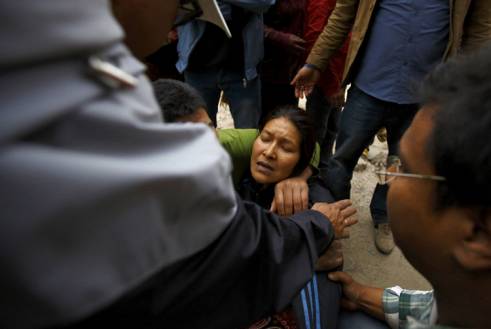By Beth Howgate
Updated 3 May
We are concerned that older people living alone or with young dependents are among the most at risk following the huge earthquake which struck Nepal on 25 April. Older men and women may be unable to access essential items due to mobility problems.
We’re working with local partners to support older people affected by the Nepal earthquake. We’re carrying out rapid assessments and conducting distributions and cash transfers.
“Older people bear the initial brunt of disasters as they are unable to flee. The physical decline that comes with ageing, including poor mobility and hearing, will mean older people are extremely vulnerable. Especially if they are caring for small children or live alone,” said Toby Porter, HelpAge’s Chief Executive.
Focus on older people’s most urgent needs
Around 8.1% of Nepal’s population are aged 60 and over. It is thought that most of the residents in the areas close to where the earthquake struck are older men and women and children, as the younger populations have left to find work.
Economic migration of the working age population has left older people vulnerable in the wake of the earthquake.
Some two million Nepalese live and work outside of Nepal, excluding those in India. Remittances account for around 25% of Nepal’s GDP with most rural families relying on income from relatives working outside the country.
“We need to focus our efforts on responding to the specific needs of older people who may not have the support of family members nearby and who may have young children in their care.
“A group of HelpAge experts is in Nepal to support the team in Kathmandu to respond as efficiently as possible,” said Porter.
Houses collapsing one by one
Nepal is ranked in the bottom quarter of HelpAge’s Disaster Risk and Age Index (30) which assesses the risk faced by older people and their ability to cope in 190 countries.
“When the earthquake hit I could see houses in the hills collapsing one by one. I was shocked because I had never experienced an earthquake of this level,” said Ashish Magar, who works with HelpAge International in Kathmandu.
“At the moment rain is hampering the aid effort. Food and water are scarce. Many of us are living outside in tents because we are too afraid the buildings will collapse from the aftershocks.
“There are few spaces in Kathmandu for people to feel safe. I stood by the river all day as this was the safest place. Everyone is in shock, even though the tremors have stopped we are still fearful,” said Magar.
What we’re doing
International aid is beginning to reach Nepal following the 7.8 magnitude earthquake. The current death toll is over 7,000. It is estimated that 8 million people have been affected by the earthquake.
Our emergency team has arrived in Kathmandu and is working with our country team and local partners.
We will initially be working with our existing partners in three of the affected districts in the Kathmandu valley. Together we will be carrying out rapid assessments and conducting distributions and cash transfers.
We are working with our local partners to be able to effectively identify older people who are most in need of cash transfers and to ascertain what they need in terms of food, shelter, healthcare and water and sanitation.
We are planning to start a programme of cash distributions next week that is targeted at vulnerable older people and their families and will enable them to replace essential possessions lost in the earthquake and to obtain what they need to survive with dignity in the aftermath of the disaster. We are working with the newly formed Cash Working Group to design the targeting and distribution methodology.
We are working with other organisations to ensure their distributions are age-friendly and appropriate for older people.
We are also looking into the most practical and effective way of ensuring older people can access the healthcare they need for chronic diseases and other health conditions. Health agencies confirm that there is a lack of prioritisation of treatment for chronic diseases in the aftermath of the earthquake, even though these conditions affect most older people.
We are attending cluster meetings on health and nutrition, food security, protection and shelter to advocate for older people to be included in the overall humanitarian response. At the moment, we are seeing that older people and people with disabilities are not being mentioned.
We are also supporting our local partners to make strong statements that to ensure that organisations responding to the disaster are aware of older people’s specific needs.
What you can do
To support older people affected by the Nepal earthquake:
